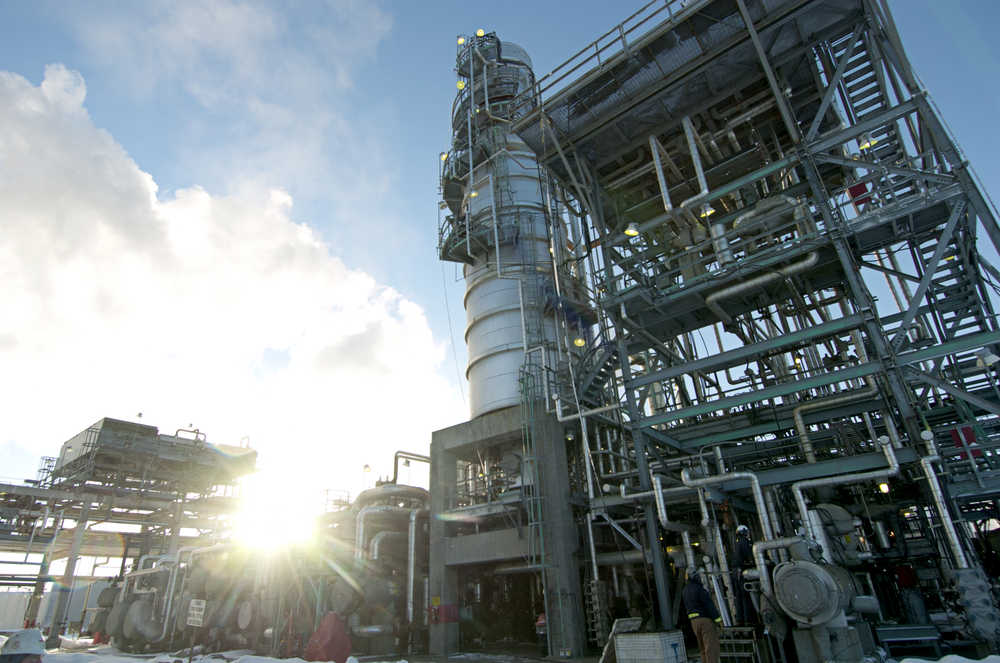The state is considering selling an additional 20,000–25,000 barrels of its royalty-in-kind oil to Tesoro Refining & Marketing Company per day as a way to prop up its finances.
The state negotiates sales of the oil it collects from North Slope producers instead of taxes to the in-state refineries. Tesoro’s Nikiski refinery is one of three that produce commercial product in Alaska at present.
Alaska Department of Natural Resources Commissioner Mark Myers’ office has negotiated a five-year contract with the company to sell some of the state’s North Slope royalty oil to be refined at the company’s facility in Nikiski. The five-year contract is shorter than in the past, giving the state more flexibility to respond to the changing market for North Slope oil.
The Nikiski refinery is currently producing less than its nameplate capacity of 72,000 barrels per day, producing approximately 65,000 barrels per day during the peak season in the summer, according to the state’s Best Interest Finding, issued March 17.
“Under the proposed contract, the sale of royalty-in-kind oil will maximize the revenue the State receives for its royalty oil,” the Best Interest Finding states. “In light of the State’s current and projected fiscal condition, the State has a heightened interest in maximizing revenue.”
The contract would at least double the current amount of royalty oil sold to Tesoro, which was approximately 15,000 barrels per day, according to the 2014 Best Interest Finding for the sale of royalty oil to Tesoro. The state estimates that the sale of the additional oil under the contract will bring in an estimated $45–$56 million in revenue in addition to what would have been obtained in value, according to the Best Interest Finding.
The finding emphasized multiple times how the state is focused on maximizing revenue through royalty oil and that the sale would help the administration to do so.
Tesoro will have a choice in how much royalty oil it purchases from the state each month. If the company chooses to purchase the maximum amount from the state, between 45 and 68 percent of the total forecast North Slope royalty oil will go to the company, according to the Best Interest Finding.
The state originally asked the state’s five refiners — BP, ConocoPhillips, Petro Star, Tesoro and FHR — whether they would be interested in purchasing more royalty oil in January 2015.
Because of the state statute requiring that royalty oil be sold and used for the benefit of Alaskans, BP and ConocoPhillips were not able to meet the standards because they ship their product out of state. Petro Star and Tesoro are the only two commercial refineries that met the requirements and responded with interest, according to the Best Interest Finding.
Of the two, Tesoro offered to accept a higher differential in price.
“…In light of the very small number of interested parties and the low probability that competitive bidding would maximize total State value, the Commissioner determined that seeking a non-competitive, negotiated agreement was in the State’s best interest, and therefore, waived competitive bidding,” the Best Interest Finding states.
Under the proposed contract, the oil will be sold to Tesoro for the monthly average of the daily high and low prices for Alaska North Slope crude. However, the state reserves the right to negotiate a price directly with Tesoro if either party feels the true market value of the crude is not being reflected in the averages.
The state has the right to limit how much oil it sells so that the total amount of royalty oil is sold does not exceed 95 percent of the total forecast production, according to the Best Interest Finding.
There is also a built-in failsafe for both parties: if Tesoro fails to purchase oil for three months in a row, the contract automatically terminates.
The Nikiski refinery currently employs 210 Alaskans and between 20 and 30 contractors, not counting the employment at its gas stations throughout the state. Though Petro Star’s refineries also produce commercial fuel, they focus on jet fuel. Tesoro is the only refinery that produces consumer gasoline in Alaska.
Tesoro is also in negotiations to purchase two oil-importing terminals previously owned by Flint Hills Resources, which shuttered its refinery operations in North Pole in 2014. The company does not plan to acquire the refinery and storage components, taking aim only at the two terminals in Anchorage and Fairbanks.
Tesoro Kenai Refinery Vice President Cameron Hunt said at a speech to the Kenai Chamber of Commerce in February that the company plans to use them to expand its market in the state.
“What we see there is an opportunity to provide fuel to the interior at a low cost,” Hunt said at the meeting.
The contract will require the Legislature’s approval. Gov. Bill Walker’s administration introduced a pair of bills to the Legislature, SB 205 and HB 373, requesting approval for the sale on March 23.
The Senate Resources Committee will discuss the bill on Wednesday, and the House Finance Committee will discuss it Thursday.
Reach Elizabeth Earl at elizabeth.earl@peninsulaclarion.com.

